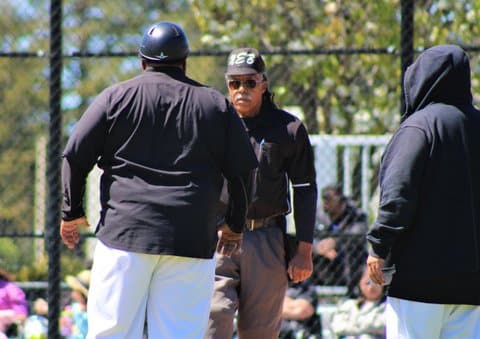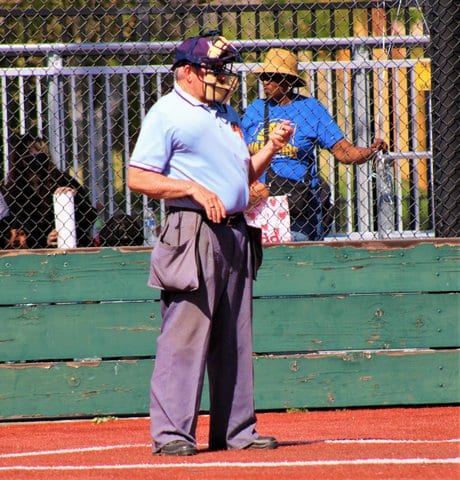
26 Nov Tactics to Halt Shortage and Silver Linings Within it Have Local Umpires Optimistic

De Anza High Dons assistant baseball coach Twon Blake and the home plate umpire during an April 15 game. (Joe Porrello / The CC Pulse file)
This story is continued from:
‘Everybody Has a Breaking Point’: Umpire Shortage Hurting Youth Sports and Officials Themselves
By Joe Porrello
Many umpires and referees say they are overworked, underpaid and mistreated, which has led to a shortage of officials in youth sports. But it’s not all bad news. Some stay in for love of the game, and many strategies are being considered to address the shortage.
Step one may be figuring out how to deal with misbehaving adults.
“Until they get control of the crowds and hold parents accountable, nothing will change, it’s only going to get worse,” said official Conrad Bassett.
A New Jersey Little League recently instituted a rule requiring parents who argue with umpires to call three games themselves before they are allowed back as a spectator.
Coaches reportedly don’t cause much of the problem, as Bassett said he’s only ever had to throw out one coach in over four decades.
According to official Dennis Binnion, umpires take slightly less abuse during high school games because coaches work for the school and are, therefore, more professional. In younger groups, this is often not the case.
“Those are the types of games where parents are just ridiculous,” said official Scott Wells, referring to sporting events below high school level.
Bassett said coaches frequently take control of feisty fans, but he utilizes the “Three P” rule when deciding whether to reprimand or eject a fan. He does so if their comments are profane, prolonged or personal.
In an attempt to limit altercations, visiting fans are being banned altogether from multiple New York City public schools.
J.R. Lindsey, the baseball coach at Vallejo’s Bethel High and a former umpire, said having more clinics and meetings for officials would help.
>>>Read: Oilers Varsity Baseball Forced to Replace Game with Scrimmage
According to Dan Hughey, founder of the Walnut Creek-based Mid-County Officials Network, officials’ meetings used to be mandatory and produced fines if missed.
“Now, they can’t fine officials because they’ll quit,” he said.
Some additional strategies to attract umpires are moving games to more convenient days for particular officials and scheduling more double-headers or games at the same location.
According to Binnion, high schools are sometimes hesitant to schedule weekend games because they would have to pay coaches overtime wages.
Bassett said that going to cover one baseball game he’s being paid $73 for may take six hours from the time he leaves his house until he gets home, which comes out to less than minimum wage.
According to Hughey, implementing a time limit for baseball and softball is also being considered to encourage umpires.
Wells said parents taking on officiating duties could be a logical step in halting the shortage.
“I think there should be an announcement (about the lack of officials) at every high school game,” he said. “Parents want their kids to have this great experience and could do something to help.”
Trying to pique umpiring interest in the youth may also be beneficial.
“I truly believe we need to get kids involved at the Little League level,” said Lindsey.
It’s never too late to become an umpire either, as Bassett did not start his long officiating tenure until he was about 30 years old.
As a coach, Lindsey found out he liked umpiring and wanted to pursue the job after trying it for the first time because of an official putting him on the spot and asking, “If you think you can do it so well, why don’t you try it?”
Officials are trying to help the situation by talking with players and coaches before games to develop rapport, and also visiting them away from the field to talk about the rules so everyone is on the same page.
It has also been a recent topic of discussion for the North Coast Section — which governs many Bay Area schools — to figure out how it can be of assistance, according to Wells.
The National Federation of State High School Associations held its second consortium in Indianapolis during January to combat the umpire shortage.
The gathering almost doubled in size since first held in April 2022, with the most recent consisting of more than 75 leaders from about 50 sports organizations ranging between youth and professional levels.
Lindsey said the flexibility and availability of games to umpire caused by the scarcity of officials can work out well for some.
“If you do the games right, you’re going to get requests all the time,” he said. “I was doing 400-plus games a year.”
Wells had similar feelings, noting that officials can sometimes make $400 in one day because of the amount of games needing to be covered.
According to Wells, the shortage has opened the door for the inclusion of more diverse umpires.
“You could do this anywhere and everywhere and immediately have an opportunity,” said Wells.
Female umpires, for instance, are much less common than officials in other sports.
There have been women officials in both the NFL and NBA, but never in MLB.
Bassett noted how vastly different the umpires in MCON are, saying they have officials with second jobs such as fast food worker or lawyer.
“We all go out there with the same uniform,” he said. “Once we step out there, the rest of the world just disappears.”
Bassett added that despite the abuse, 99 percent of his interactions at games are positive.
“I have fun doing it,” he said. “You can probably hear it in my voice.”
Only a small proportion of bad-acting people contribute to the umpire shortage. The majority of players, coaches and parents don’t cause problems.
“We don’t want to penalize the parents and kids that are actually doing right,” said Binnion.
Wells said entire sports programs have been dropped recently because they can’t fill the need for officials, like junior varsity high school teams.
“I just don’t see this level of attrition being able to continue,” said Hughey.
If there are no officials, there is no game.






No Comments